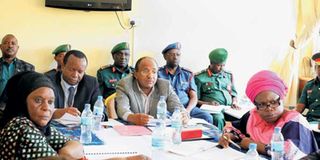State telco to send home 600

Defence and National Service minister Hussein Mwinyi (middle), ministry’s permanent secretary Florence Turuka (second left) follow proceedings during a meeting with members of the Parliamentary Committee for Foreign Affairs, Defence and Security as they reviewed implementation of the 2017/2018 ministry’s budget in Dodoma yesterday. PHOTO | BUNGE OFFICE
Dodoma. TTCL Corporation plans to retrench more than 600 workers as part of cost-cutting measures.
This was revealed by TTCL board chairman Omary Nundu during the company meeting with the Parliamentary Public Investment Committee held here yesterday.
Mr Nundu admitted that the company’s operations costs were still high even as President John Magufuli issued a directive for the company to cut the costs.
The former Works, Transport and Communications minister said currently TTCL has over 1,500 workers.
“Plans are afoot to retrench 600 workers. This is in line with the President’s directive. We will also cut other unnecessary expenditures,” said Mr Nundu but did not give further elaborations.
He added: “We need some time to revive the company. I’m sure that we will succeed because we have set strategic plans.”
Earlier on, committee chairman Raphael Chegeni said TTCL’s performance did not reflect President Magufuli’s slogan ‘Rudi Nyumbani kumenoga’ (Come back home, all is good).
Dr Chegeni said TTCL charges were still high compared to its competitors in the market.
“Apart from lowering the costs you should also increase your network coverage if you really want tom compete,” said Dr Chegeni.
He also urged TTCL to speed up the process of drafting the National Information Communication Network Broad Band regulations.
“It is risk to run the National Information Communication Network Broad Band without having regulations, it is time that you completed drafting them,” said Dr Chegeni.
Meanwhile, the parliamentary committee for Infrastructure has urged the government to widen the implementation of the project to construct Standard Gauge Railway (SGR) so that it could cover other strategic areas in the country.
“We need to grab market opportunities from Rwanda, DRC, Uganda and other places but we can’t do it without having transportation system,” committee chairman Suleiman Kakoso said.
Speaking to reporters at the Parliament grounds, Mr Kakoso said Tanzania Railway Corporation (TRC) told the committee that the implementation of the project from Dar es Salaam to Morogoro had reached 32 per cent and that from Morogoro to Dodoma had reached 3 per cent.



